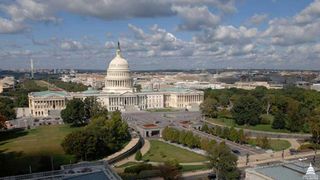Reps. React to DOJ/SEC Investigation of Apple Phones

A pair of Democratic legislators who pressed Apple on what appeared to be their built-in iPhone obsolescence are taking a wait and see approach now that the Department of Justice and SEC are investigating the computer company's slowing of older iPhones.
Apple has said it was simply trying to preserve battery life and prevent unexpected shutdowns and not artificially shorten the life of its product.
Reps. Robin Kelly (D-Ill.), ranking member of the House Investigative and Oversight Committee, and Emanuel Cleaver II (D-Mo.), who wrote Apple CEO Tim Cook with concerns about that software that slowed older phones performance, said that Apple has since offered to provide insight into why they made that modification and had only gentle words of caution for the company.
"Leading companies and innovators should not only ‘think different,’ they should ‘act differently’ when it comes to customer transparency and inclusion," they said. "While we don’t know what will come of the DOJ and SEC probes, we do know that all of us can work together to reach constructive solutions that promote innovation and accountability in the tech sector.”
Some backers of applying network neutrality protections on edge providers as well as ISPs have noted the Apple slowing and likened it to the kind of throttling edge providers accuse ISPs of engaging in.
Related: Pai: Apple Promoting Online Censorship
FCC chair Ajit Pai last month suggested the parade of horribles whipped up by foes of his network-neutrality rule rollback order is just meant to feed into a false narrative, and that the real story is that edge providers are a bigger threat to an open internet than ISPs and could use some of the transparency the FCC will be requiring of ISPs.
For example, Apple did not tell customers older phones were slowed to save battery life.
FCC chairman Ajit Pai suggests the parade of horribles whipped up by foes of his network neutrality rule rollback order are just meant to feed into a false narrative, and that the real story is that edge providers are a bigger threat to an open net than ISPs and could use some of the transparency the FCC will be requiring of ISPs in its new Restoring Internet Freedom order.
Broadcasting & Cable Newsletter
The smarter way to stay on top of broadcasting and cable industry. Sign up below
Contributing editor John Eggerton has been an editor and/or writer on media regulation, legislation and policy for over four decades, including covering the FCC, FTC, Congress, the major media trade associations, and the federal courts. In addition to Multichannel News and Broadcasting + Cable, his work has appeared in Radio World, TV Technology, TV Fax, This Week in Consumer Electronics, Variety and the Encyclopedia Britannica.

